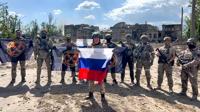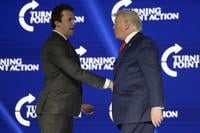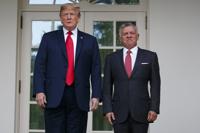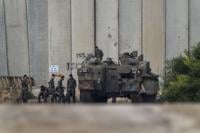BEIJING (AP) — China’s muted reaction to the Wagner mercenary group uprising against Russia's military belies Beijing’s growing anxieties over the war in Ukraine and how this affects the global balance of power.
China’s ruling Communist Party called Moscow's “internal affair,” with state media affirming China’s support for Russia.
Chinese observers said the incident showed how overblown Western rhetoric was regarding the “Russian internal conflict” and that President Vladimir Putin’s hold on power remains secure.
But the uprising also threatens to deepen growing anxieties in Beijing over Russia’s war in Ukraine, given China’s limited ability to influence the situation.
China has maintained a consistent position on the war: neutral on paper, but favoring Russia in practice, with frequent state visits and joint military drills between the two nations. It’s a delicate balance, calibrated carefully to avoid damaging relations with Russia or Europe, both of which Beijing sees as critical to countering American power.
That stance continues. But in recent months, government advisors have expressed increasing frustration with Russia behind closed doors, feeling Beijing is increasingly being “dragged around” by Moscow’s risk-taking behavior, according to interviews with Chinese and foreign academics and diplomats.
Some draw comparisons with China’s relationship with North Korea, whose leadership exasperates Beijing at times with erratic behavior but nonetheless benefits from Chinese economic aid and diplomatic support.
The Wagner rebellion has “likely raised doubts about whether Beijing made the right bet in designating the Kremlin, and Putin specifically, as a close ally and partner,” said Patricia M. Kim, an expert on Chinese politics and foreign policy at the Brookings Institution think tank in Washington, D.C.
“Chinese leaders must be concerned that China’s strategic alignment with a weakened Russia may turn out to be a net burden rather than a plus to China’s strategic interests,” Kim said.
Chinese state military academics worry about Russia’s underwhelming performance in the war. It raises questions over China's military structures, which were heavily influenced by the former Soviet Union.
China is also seen as closely watching the conflict in Ukraine for indications of possible ramifications to its threat to enforce a blockade, invade or coerce the self-governing island of Taiwan, a close U.S. ally, into accepting Communist Party control.
As to the recent developments in Russia, “China realizes that the system is more brittle than they thought, that Putin is more incompetent than they would love to see," said Alexander Gabuev, director of the Carnegie Russia Eurasia Center
“What leads to this frustration to an extent is that China cannot do anything about it,” he said.
China has embarked on a flurry of diplomacy in recent months, positioning itself as a neutral mediator in the conflict. Chinese leader Xi Jinping met Putin in Moscow and called Ukrainian President Volodymyr Zelenskyy earlier this year, and published a 12-point proposal urging the two sides to come to the negotiating table.
The prospects for a peace deal are slim at the moment, and even Chinese experts acknowledge behind closed doors that Beijing's proposal is unrealistic.
China's real goal in calling for negotiations, analysts say, is to convince Europe that it is acting in good faith and prevent relations from deteriorating. Chinese officials bristle at U.S. attempts to portray Beijing as a backer of Moscow, seeing it as an attempt to alienate Europe from China.
“It’s not that China wants to be closer to Russia. It’s that the U.S. is forcing that," Wang Huiyao, a Chinese foreign policy advisor and president of the Center for China and Globalization, a Beijing-based think tank.
Still, the two countries share common grievances against Washington. Chinese and Russian officials have both had travel and financial sanctions imposed against them by the U.S., and watch U.S.-led military alliances warily.
Chinese foreign policy experts are worried that the war has revitalized NATO and the U.S. alliance with Europe, and fret that this could prompt a renewal of American alliances in East Asia.
Chinese military experts grilled Western diplomats in private about reports that NATO might open a liaison office in Japan, worried that it might represent the expansion of the organization's interests in East Asia, three people with knowledge of the matter told The Associated Press.
A civil war or major political conflict in Russia would have a definite impact on relations between Beijing and Moscow, particularly with the Chinese president seeing the two aligning to challenge the U.S.-led liberal world order.
“Historically, the U.S. never trusted Russia and has always attempted to dismember it into smaller countries. To the United States, Russia and China are their major threats,” said Li Xin, director of the Institute of European and Asian Studies of Shanghai University of Political Science and Law.










































